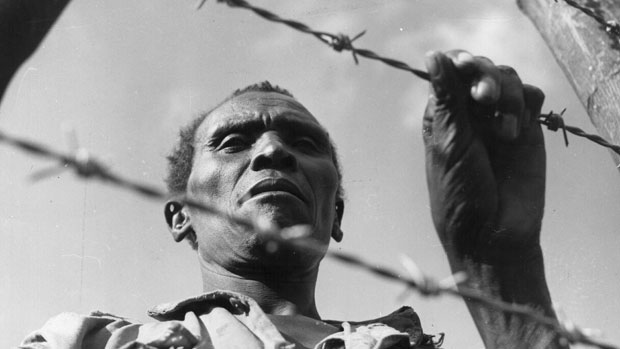Justice for Kenya's Mau Mau as UK offers cash and apology
Compensation of £20m for 5,200 insurgents abused and tortured by British troops in colonial Kenya

A free daily email with the biggest news stories of the day – and the best features from TheWeek.com
You are now subscribed
Your newsletter sign-up was successful
THE BRITISH government has apologised and offered compensation of £20 million, to more than 5000 Kenyans abused and tortured during the Mau Mau uprising in the 1950s and 60s.
- Justice for Kenya’s Mau Mau – in pictures
The BBC reports that Foreign Secretary William Hague told the Commons today his government "sincerely regrets" the abuse of victims who suffered beatings, rape and castration at the hands of the then-British administration. About 5,200 Kenyans say they were abused during the so-called Kenyan 'Emergency' between 1952 and 1960, when fighters from the Mau Mau nationalist movement attacked British targets.
Sky News estimates the compensation deal will pay victims about £3000 each. While the sum per claimant is modest by British standards it is about five times Kenya's national income per capita.
The Week
Escape your echo chamber. Get the facts behind the news, plus analysis from multiple perspectives.

Sign up for The Week's Free Newsletters
From our morning news briefing to a weekly Good News Newsletter, get the best of The Week delivered directly to your inbox.
From our morning news briefing to a weekly Good News Newsletter, get the best of The Week delivered directly to your inbox.
The UK had repeatedly tried to "block" legal attempts by the Mau Mau to claim compensation. It argued that responsibility for the mistreatment of members of the nationalist organisation, which was formed in the 1950s by the Kikuyu people, had transferred to the Kenyan government upon independence in 1963.
Britain’s lawyers also argued that too much time had elapsed for a fair trial, reports The Independent. But the discovery of an archive of 8,000 documents from 37 former colonies persuaded British judges that this was not the case.
One of the documents was a memo from Eric Griffith-Jones, then the Attorney general of Kenya, who agreed to beatings as long as they were done secretly. "If we are going to sin, we must sin quietly," he wrote.
In October last year, a London court ruled that three elderly victims who were tortured during the crackdown by British troops could sue the UK.
A free daily email with the biggest news stories of the day – and the best features from TheWeek.com
Lawyers allege that Paulo Muoka Nzili was castrated, Wambuga Wa Nyingi was severely beaten and Jane Muthoni Mara was subjected to "appalling sexual abuse" in detention camps during the rebellion, the BBC reports.
The court ruling forced Whitehall to change tack and begin the negotiations which have lead to today’s apology and offer of compensation.
-
 The ‘ravenous’ demand for Cornish minerals
The ‘ravenous’ demand for Cornish mineralsUnder the Radar Growing need for critical minerals to power tech has intensified ‘appetite’ for lithium, which could be a ‘huge boon’ for local economy
-
 Why are election experts taking Trump’s midterm threats seriously?
Why are election experts taking Trump’s midterm threats seriously?IN THE SPOTLIGHT As the president muses about polling place deployments and a centralized electoral system aimed at one-party control, lawmakers are taking this administration at its word
-
 ‘Restaurateurs have become millionaires’
‘Restaurateurs have become millionaires’Instant Opinion Opinion, comment and editorials of the day
-
 Epstein files topple law CEO, roil UK government
Epstein files topple law CEO, roil UK governmentSpeed Read Peter Mandelson, Britain’s former ambassador to the US, is caught up in the scandal
-
 Iran and US prepare to meet after skirmishes
Iran and US prepare to meet after skirmishesSpeed Read The incident comes amid heightened tensions in the Middle East
-
 Israel retrieves final hostage’s body from Gaza
Israel retrieves final hostage’s body from GazaSpeed Read The 24-year-old police officer was killed during the initial Hamas attack
-
 China’s Xi targets top general in growing purge
China’s Xi targets top general in growing purgeSpeed Read Zhang Youxia is being investigated over ‘grave violations’ of the law
-
 Panama and Canada are negotiating over a crucial copper mine
Panama and Canada are negotiating over a crucial copper mineIn the Spotlight Panama is set to make a final decision on the mine this summer
-
 Why Greenland’s natural resources are nearly impossible to mine
Why Greenland’s natural resources are nearly impossible to mineThe Explainer The country’s natural landscape makes the task extremely difficult
-
 Iran cuts internet as protests escalate
Iran cuts internet as protests escalateSpeed Reada Government buildings across the country have been set on fire
-
 US nabs ‘shadow’ tanker claimed by Russia
US nabs ‘shadow’ tanker claimed by RussiaSpeed Read The ship was one of two vessels seized by the US military